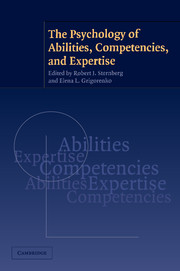Book contents
- Frontmatter
- Contents
- Preface
- List of Contributors
- The Psychology of Abilities, Competencies, and Expertise
- 1 Trait Complexes, Cognitive Investment, and Domain Knowledge
- 2 Intelligence as Adaptive Resource Development and Resource Allocation: A New Look Through the Lenses of SOC and Expertise
- 3 Developing Childhood Proclivities into Adult Competencies: The Overlooked Multiplier Effect
- 4 The Search for General Abilities and Basic Capacities: Theoretical Implications from the Modifiability and Complexity of Mechanisms Mediating Expert Performance
- 5 On Abilities and Domains
- 6 Expertise and Mental Disabilities: Bridging the Unbridgeable?
- 7 The Early Progress of Able Young Musicians
- 8 Expertise, Competence, and Creative Ability: The Perplexing Complexities
- 9 Biological Intelligence
- 10 What Causes Individual Differences in Cognitive Performance?
- Index
- References
2 - Intelligence as Adaptive Resource Development and Resource Allocation: A New Look Through the Lenses of SOC and Expertise
Published online by Cambridge University Press: 05 June 2012
- Frontmatter
- Contents
- Preface
- List of Contributors
- The Psychology of Abilities, Competencies, and Expertise
- 1 Trait Complexes, Cognitive Investment, and Domain Knowledge
- 2 Intelligence as Adaptive Resource Development and Resource Allocation: A New Look Through the Lenses of SOC and Expertise
- 3 Developing Childhood Proclivities into Adult Competencies: The Overlooked Multiplier Effect
- 4 The Search for General Abilities and Basic Capacities: Theoretical Implications from the Modifiability and Complexity of Mechanisms Mediating Expert Performance
- 5 On Abilities and Domains
- 6 Expertise and Mental Disabilities: Bridging the Unbridgeable?
- 7 The Early Progress of Able Young Musicians
- 8 Expertise, Competence, and Creative Ability: The Perplexing Complexities
- 9 Biological Intelligence
- 10 What Causes Individual Differences in Cognitive Performance?
- Index
- References
Summary
The psychology of intelligence has undergone major changes in theoretical orientation and in its empirical approach since its early days close to a hundred years ago (Sternberg, 1990; Sternberg and Detterman, 1986). For the pioneers of intelligence testing, most notably Binet and Stern, the concept of intelligence captured relatively stable, interindividual differences in general abilities and capacities that were relevant to acquiring new skills and learning in novel situations. The idea of adaptation in the sense of mastering the challenges of a changing environment was constituent for the concept of intelligence in its earliest forms. In the minds of the general public until today, having a high IQ was synonymous with being smart and having a large potential for successfully coping with all kinds of professional and everyday challenges.
Due to these underlying theoretical ambitions the construction of intelligence tests in the decades following the pioneering stages faced no less than the triple challenge (1) to identify basic capacities that (2) reflected stable interindividual differences, and (3) that were general in terms of their relevance for all kinds of real-life competencies and skills. In response to these challenges extant psychometric tests have narrowed down the conceptual scope of the intelligence concept quite considerably. Implicit in the psychometric approach to intelligence is a focus on measurement (as opposed to understanding the causes, contexts, and functions of intelligence) and the view that intelligence reflects a collection of fairly static or dispositional abilities that characterizes a person (as opposed to a dynamic system of contextualized and adaptive cognitive functions that individuals continue to acquire throughout their life course).
- Type
- Chapter
- Information
- The Psychology of Abilities, Competencies, and Expertise , pp. 31 - 69Publisher: Cambridge University PressPrint publication year: 2003
References
- 22
- Cited by

